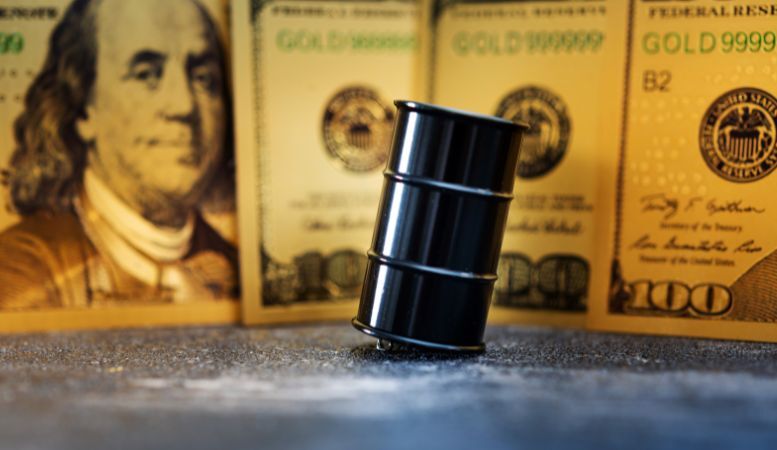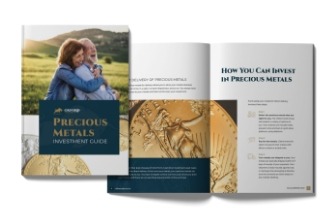Table of Contents
Gold is an extremely stable commodity as far as price levels go. However, with so many factors affecting how the commodities market performs, keeping up can be complex. Do oil prices determine gold prices, or is the influence negligible?
In this guide, Oxford Gold Group’s gold IRA experts go over the relationship between gold and oil for some clarity on your investment choices.
How Do Oil Prices and Gold Prices Relate?
Oil and gold prices tend toward a positive correlation. You can see this when viewing gold and oil’s time-based price charts, with both commodities reacting similarly to the same type of economic pressure. For example, each of these assets’ price levels will respond to changes in the U.S. dollar, inflation, or interest rates by moving in the same direction.
However, in commodities, as in everything else, a correlation does not constitute causation. Oil does not necessarily determine the gold price. However, because they move together, oil can give you some helpful insight into the direction in which your gold investment is going to move.
Oil prices tend to be more volatile when responding to immediate supply and demand concerns. But while gold may also have a finite supply, its relative stability means that any pricing adjustments are slower to respond to these same market pressures. So, gold typically provides more trading stability and security, given its larger and more confirmed inventory levels.
What Is the Gold-to-Oil Price Ratio?

The gold-to-oil ratio is an investor’s calculation tool to outline the comparative value between these two assets at any given time.
With this financial mechanism, you can easily calculate the current pricing difference between an ounce of gold and a barrel of oil. You can then use the ratio to determine whether or not you would gain more purchasing power by investing in gold or oil at the current time.
Speculators will use this type of ratio to identify excessive pricing, which is a potential opportunity to fill the market’s pricing gaps for profit. The idea is to buy into the lower-priced asset to improve your odds of higher returns. However, while this is helpful information for short-term portfolio moves and risky investment choices that could pay big, it’s less helpful in the long term.
If you’re looking at gold as an investment in your legacy long-term, numerous other market conditions will play into your final decision.
How To Calculate the Gold-Oil Ratio
Calculate the gold-to-oil ratio as follows:
- Divide the current price of one ounce of spot gold by the crude oil price for one barrel.
- Any number over 16 typically suggests that gold prices are too high (or oil prices are low). This could be an opportunity to buy into oil while the prices are low.
- A ratio under 16 suggests the opposite: gold prices are nice and low compared to oil. Some traders may see this lower ratio as an opportunity to buy into gold.
The ratio represents one small consideration in your portfolio decision. However, tools like this can help you choose one asset over another as you plan your investments.
What Primarily Affects Gold Prices?

Gold and oil prices typically vary the most during periods of economic turmoil, but do oil prices determine gold prices in any way? Typically, gold gains its value from numerous factors, and oil isn’t one of its primary influences. While oil prices help investors understand gold prices, the commodity does not directly impact gold the way other factors do.
So, what factors primarily affect gold prices? Here are a few to consider:
Monetary Policies
While gold may perform best during periods of high inflation, unfavorable monetary policies quickly reverse this trend. When price levels increase, central banks and the U.S. Federal Reserve increase interest rates to reduce borrowing and thereby bring inflation down. Typically, high interest rates increase the opportunity costs of investing in non-yielding assets, like gold, and make them less attractive.
Central Bank Reserves
Central banks carry different types of assets in their reserves, including currencies and gold. When geopolitical tensions or inflation run high, central banks often increase their gold reserves as a security measure, which increases the demand for gold and boosts its spot price.
Retail Demand
Nations around the globe cherish gold for its use in cultural celebrations and gift-giving. Jewelry accounts for around 50% of global gold demand, with India, China, and the United States being key drivers.
Investment Demand
Investors purchase gold to hedge against inflation and protect their wealth from economic turmoil. Investment demand for gold often spikes when other asset classes, like real estate, bonds, or equities, fail.
Gold Production Rates
When gold production rates from the mining sector fall, the constricted supply shoots up prices. For example, the markets saw a major drop in 2020 and 2021, as news surfaced that much of the globe’s gold supply was already out of the ground.
What’s the Effect on Gold and Oil Prices When the Dollar Falters?

Gold has a strong inverse relationship with the U.S. dollar because investors hedge gold against inflation. When the U.S. dollar loses value and prices are expected to rise, gold performs better. So, a drop in the U.S. dollar can increase gold demand as inflation spikes safe-haven buying, but does this type of event affect oil prices?
Since oil also typically has an inverse relationship with the U.S. dollar, we see that correlation happening when the U.S. dollar falters: there’s an increase in oil prices and gold. The market also prices oil (and gold) in U.S. dollars, so when it weakens, it quite literally takes more money to purchase a barrel of oil (or an ounce of gold).
Two Arguments: Inflation and Commodities
Do oil prices determine gold prices? To decide, we must analyze common theories about this relationship. Opinions vary considerably, but two major discussions revolve around prices and predictions.
The Argument for Inflation
Some analysts argue that oil prices directly determine gold prices. They say a higher oil price increases the production cost of goods, triggering price increases. The inflationary trend then increases the price of gold.
However, the argument for inflation contends that oil prices are not the primary trigger in the above scenario. Instead, it points to a weaker U.S. dollar or inflation that triggers both gold and oil price increases. This is because more dollars are suddenly required to buy the same amount of gold or oil.
The Argument for Commodities
A second argument on gold and oil’s relationship involves how oil prices predict gold’s performance as a raw material. Gold and oil prices follow similar pricing trends because their physical supply and demand rates as raw materials correlate. For instance, demand (and prices) rise as supply drops.
The commodities argument isn’t perfect. Historically, gold has not followed the strict supply-demand structure as strongly as oil does.
Try Gold Investing With Precious Metals Experts
Do oil prices determine gold prices some of the time? Begin investing in gold, and you’ll see that it doesn’t really matter long-term.
Why not look into Oxford Gold Group’s range of IRA-approved gold bullion products and gold IRAs? Contact the team at (833) 600-GOLD today to learn more.








